Archive for October, 2012

Power returns after lightening hits lines
 (CNS): Updated 11:40am — Impressive electrical storms across Grand Cayman may provide a great free light show but they caused trouble for the local power company. Customers in parts of George Town, Prospect, Frank Sound, Rum Point, East End, Bodden Town and Savannah were without power from about 4am today following suspected multiple lightning strikes that affected the CUC transmission system. Customers served by the Rum Point, Frank Sound, Bodden Town and Prospect substations were affected. Power was restored to all customers by 6:10am. CUC sincerely apologizes for the inconvenience these outages may have caused.
(CNS): Updated 11:40am — Impressive electrical storms across Grand Cayman may provide a great free light show but they caused trouble for the local power company. Customers in parts of George Town, Prospect, Frank Sound, Rum Point, East End, Bodden Town and Savannah were without power from about 4am today following suspected multiple lightning strikes that affected the CUC transmission system. Customers served by the Rum Point, Frank Sound, Bodden Town and Prospect substations were affected. Power was restored to all customers by 6:10am. CUC sincerely apologizes for the inconvenience these outages may have caused.
Thunderstorms have been behind a number of power failures recently that has also affected the TV station as well as CUC.
However, the firm has also had cause to cut power on a rolling basis recently as a result of maintenance issues which have since been addressed. According to the local weather services further thunderstorms are forecast for the next three days.
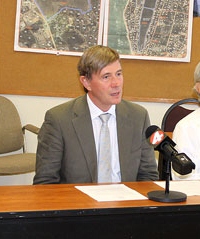
TCI constitution proclaimed after 3 year-direct rule
 (CNS): The Turks and Caicos constitution finally came into effect Monday marking the beginning of the end for the UK government ahead of the General Election next month when democracy will return to the overseas territory. The UK took over three years ago in the wake of a major corruption scandal and began a controversial reform programme designed to improve transparency, accountability and public financial management. With what were termed as the eight milestones largely achieved country’s new constitution has now been proclaimed.
(CNS): The Turks and Caicos constitution finally came into effect Monday marking the beginning of the end for the UK government ahead of the General Election next month when democracy will return to the overseas territory. The UK took over three years ago in the wake of a major corruption scandal and began a controversial reform programme designed to improve transparency, accountability and public financial management. With what were termed as the eight milestones largely achieved country’s new constitution has now been proclaimed.
“Today marks the culmination of a huge amount of work to get the country to this point where it is significantly more transparent, accountable and financially better run,” the TCI governor, Ric Todd said. “We now have a modern Constitution that is the result of wide consultation including a Turks and Caicos delegation who visited London in the summer of 2011 to help ensure that it reflects the wishes of both the citizens of the islands and Ministers in London.”
The former OT’s mnister from the FCO Henry Bellingham had announced in the that sufficient progress had been made to allow elections and the governor said he was impressed by the “diligent preparations” of the local political parties. .
“We have an experienced international observers coming to our Islands for the elections. They will be here to ensure that 9thNovember passes off as intended as a free and fair democratic election. I welcome their presence and look forward to receiving their reports over the weekend after polling day,” he added. “The Government’s work does not now stop until after the election results are announced and a new administration is in place.”
Todd stated that the new constitution will help the incoming administration govern fairly and transparently, and in tandem with the other legislative enhancements.
“The education programme launched last week by the Supervisor of Elections will ensure that all citizens eligible to vote are fully informed on the new electoral system and the choices they will be asked to make on the Electoral District and All Island ballot papers,” hesaid. ““The building blocks for successful elections are now in place and we all eagerly anticipate the return to elected government here in the Turks and Ciacos Islands.”
The interim administration had taken over TCI following the suspension of parts of the previous 2006 Constitution after the Sir Robin Auld Commission of Inquiry found that there was “a high probability of systemic corruption in government and the legislature and among public officers in the Turks & Caicos Islands in recent years.”

Importance of statistics pressed by ESO
 (CNS): The Economics and Statistics Office will be doing its best to emphasise the importance of statistics Monday, in a community that is often reluctant to take part in surveys. The ESO will lead observance of the CARICOM-designated Caribbean Statistics Day in the Cayman Islands. This year’s theme, Working together to improve statistics in the 21st century and beyond and the office will highlight the importance of statistics that are credible, relevant, timely and user-friendly and that inform meaningful decision-making by government, the private sector and all other stakeholders.
(CNS): The Economics and Statistics Office will be doing its best to emphasise the importance of statistics Monday, in a community that is often reluctant to take part in surveys. The ESO will lead observance of the CARICOM-designated Caribbean Statistics Day in the Cayman Islands. This year’s theme, Working together to improve statistics in the 21st century and beyond and the office will highlight the importance of statistics that are credible, relevant, timely and user-friendly and that inform meaningful decision-making by government, the private sector and all other stakeholders.
In his message marking the regional day the Secretary-General Of The Caribbean Community (Caricom), Irwin Larocque, said the day underscores the need for collaborative actions and the building of partnerships to enable the investment of adequate resources in statistics.
Despite certain achievements across the region he said there were still critical data gaps and problems with the quality and timeliness of the statistics.
“Statisticians across the Region are encouraged to continue to bridge the gaps in the data and in its timeliness, which will ensure that users of statistics are provided with accurate, reliableand timely statistics for decision-making,” he said.
On Monday, ESO staff will make presentations on the Census data to students of John Gray and Clifton Hunter high schools during the day about their work in Cayman and a similar presentation to the statistics students at the University College of the Cayman Islands at 7.30pm. Additionally, Sterling Dwayne Ebanks will host a group discussion on Radio Cayman’s Talk Today at 1 p.m., featuring ESO Acting Director Elizabeth Talbert and Senior Statistician Julietta Beaupierre, Customs Training Manager Langlie Powery and Chamber of Commerce CEO Wil Pineau.
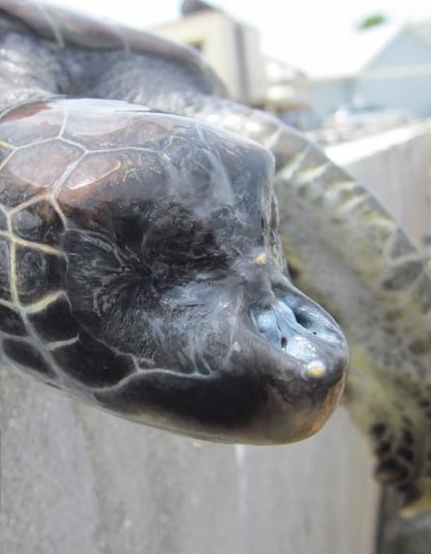
Report slams Turtle Farm
 (CNS): A global animal welfare charity has published a damning report on the Cayman Turtle Farm, which suggests that there are some serious shortcomings at the facility. The report by the World Society for the Protection of Animals (WSPA) found that the Farm is not meeting the welfare needs of the animals under its care and poses a threat not just to those animals but the wild population as well. It points to very poor conditions, including water quality, the turtles’ diet, disease, congenital defects in the captive bred creatures and overcrowding in the tanks. Criticising the organisation, government has denied the allegations and announced plans for an independent audit of CTF.
(CNS): A global animal welfare charity has published a damning report on the Cayman Turtle Farm, which suggests that there are some serious shortcomings at the facility. The report by the World Society for the Protection of Animals (WSPA) found that the Farm is not meeting the welfare needs of the animals under its care and poses a threat not just to those animals but the wild population as well. It points to very poor conditions, including water quality, the turtles’ diet, disease, congenital defects in the captive bred creatures and overcrowding in the tanks. Criticising the organisation, government has denied the allegations and announced plans for an independent audit of CTF.
Government and the CTF accused WSPA on Friday of making “spurious” and “sensational” allegations as part of its goal is to end the commercial farming operation and change the local culture because of a failure to understand Cayman.
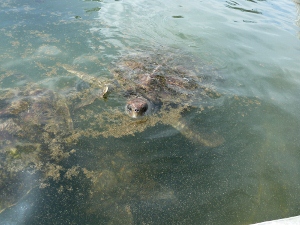 The Turtle Farm costs the public purse some CI$10 million in subsidies every year and the price of turtle meat which it produces has increased significantly. According to the research conducted by the WSPA, it costs each tax payer almost CI$12,000 to produce a turtle for meat. WSPA said it presented its report to the Cayman Turtle Farm much earlier this year but the CTF has not released or commented on the findings until now, which has come as a result of the WSPA’s decision to go public with its campaign to persuade government to change the farm to a real conservation facility.
The Turtle Farm costs the public purse some CI$10 million in subsidies every year and the price of turtle meat which it produces has increased significantly. According to the research conducted by the WSPA, it costs each tax payer almost CI$12,000 to produce a turtle for meat. WSPA said it presented its report to the Cayman Turtle Farm much earlier this year but the CTF has not released or commented on the findings until now, which has come as a result of the WSPA’s decision to go public with its campaign to persuade government to change the farm to a real conservation facility.
Government officials from both the premier’s ministry and the Turtle Farm released statements late Friday evening denying all the accusations and criticising the animal welfare organisation. It said it had never been accused of these things before and there was no evidence for the WSPA’s findings.
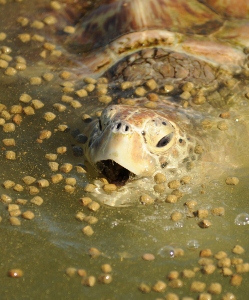 “The CTF is subject to regular inspections by government entities, as well as independent external assessors, to ensure that it complies with health and safety regulations and provides a high quality and responsible tourism experience,” government said. “Prior to the claims by the WSPA, the Cayman Islands Government has never been confronted with allegations or claims of evidence of animal cruelty, nor has there been any suggestion whatsoever of risks to the health and safety of visitors who enjoy the attraction.”
“The CTF is subject to regular inspections by government entities, as well as independent external assessors, to ensure that it complies with health and safety regulations and provides a high quality and responsible tourism experience,” government said. “Prior to the claims by the WSPA, the Cayman Islands Government has never been confronted with allegations or claims of evidence of animal cruelty, nor has there been any suggestion whatsoever of risks to the health and safety of visitors who enjoy the attraction.”
However, the WSPA report includes details supported by damning pictures. The organisation also has film footage to support its claims showing disease, overcrowding, poor water conditions and many other problems at the facility. Calling for the farm to be converted into a conservation facility and to cease the commercial farming, which the activists say has been a failure, the WSPA has offered to assist in the transition, but it states that the Farm has not responded to that offer.
Government claims that the Turtle Farm has had discussions with the charity, which is when it agreed to independent examination of the WSPA’s claims.
“Notwithstanding the preponderance of evidence to the contrary, the allegations by the WSPA are being taken seriously,” government said, adding it that it would conduct an audit of the farm operations and the welfare of the animals in December. However, it said changing the model of the farm would require a political decision.
“In all meetings and communications with the WSPA thus far, it has been clearly stated that the decision to alter the business model and objectives of the Cayman Turtle Farm would require a decision by the Cayman Islands Cabinet, and a timeline was agreed and subsequently adjusted by both parties to enable these high-level discussions to take place,” the farm said in a statement released Friday afternoon.
But instead, the farm claimed, the WSPA has “embarked on a smear campaign to coerce the Turtle Farm to submit to the WSPA’s demands”, even though “their allegations are unfounded, erroneous and sensationalised,” the statement read.
The Turtle Farm said it found no evidence of the kinds of injuries or defects among the turtles that the WSPA is listing in its report. “Rather, we have instead succeeded in maintaining the health and well-being of our turtle population through established veterinary treatment protocols and methods,” it said.
However, for some time there have been major concerns about the farm’s hatch ratings, the death of hatchlings and other problems regarding the quality of the water and feed. More recently, a tank full of 300 turtles died as a result of some technical fault in a tank during repairs to a leak in the farm’s main pipe. A full explanation of what happened has not yet been given to the tax-payer.
The WSPA has a number of pictures clearly showing poor water quality, as well the over-crowded conditions, disease and defects in the population of turtles at the farm. It says that turtles need substantial amounts of good quality water but the tanks at the farm are not cleaned regularly, leaving uneaten food and voided faeces that quickly contaminate the living environment.
“The result is a foul mix of water, debris and pathogenic microorganisms including bacteria and viruses that pose a significant threat to turtle welfare,” the report found.
Among other criticisms WSPA notes that the turtles which would normally eat sea grass as adults in the wild are fed solely on a fish food pellets. It also describes the problems associated with the arbitrary handling of turtles by members of the public. It said this is stressful for the turtle and can lead to injury if the inexperienced handler drops a struggling animal. The report warns that with traces of disease and pathogens on the turtle visitors could also get sick.
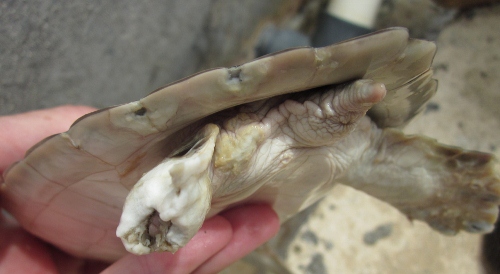 The WSPA says it saw significant evidence of congenital defects throughout the farm. “Many of these individuals exhibit anophthalmia (absence of one or both eyes) with marked skeletal deformities,” the report states. “In the wild, these deformities would most likely have resulted in early natural mortality … in the farm, their blindness renders them even more susceptible to injury and disease as a result of their reduced ability to feed and avoid co-occupant aggression.”
The WSPA says it saw significant evidence of congenital defects throughout the farm. “Many of these individuals exhibit anophthalmia (absence of one or both eyes) with marked skeletal deformities,” the report states. “In the wild, these deformities would most likely have resulted in early natural mortality … in the farm, their blindness renders them even more susceptible to injury and disease as a result of their reduced ability to feed and avoid co-occupant aggression.”
Although the turtle farm has claimed that it makes a significant contribution to conservation because of the release programme, the report states that the CTF’s conservation efforts may be negligible or even detrimental to wild turtle populations.
“Following a detailed assessment, WSPA also has severe concerns regarding the potential impact of the Cayman Turtle Farm on wild sea turtle conservation efforts,” it stated.
“We want to help the farm change for the better,” Dr Neil D’Cruze, the WSPA Wildlife Campaign Leader said in the wake of the release of the report. “But its unwillingness to meet us halfway is posing a great challenge. There’s a reason that CTF is the last turtle farm in the world – it’s an outdated model which no longer does justice to the Cayman Island’s turtle heritage.
“WSPA wants to work with the farm to turn the facility into a place that Caymanians can be proud of. Science and society moves on and WSPA would like to help CTF make a positive change, for the turtles, for tourism and for the island,” he added.
See statements from government and the WSPA report below.
See more on the campaign and images here
All pictures provided by WSPA.
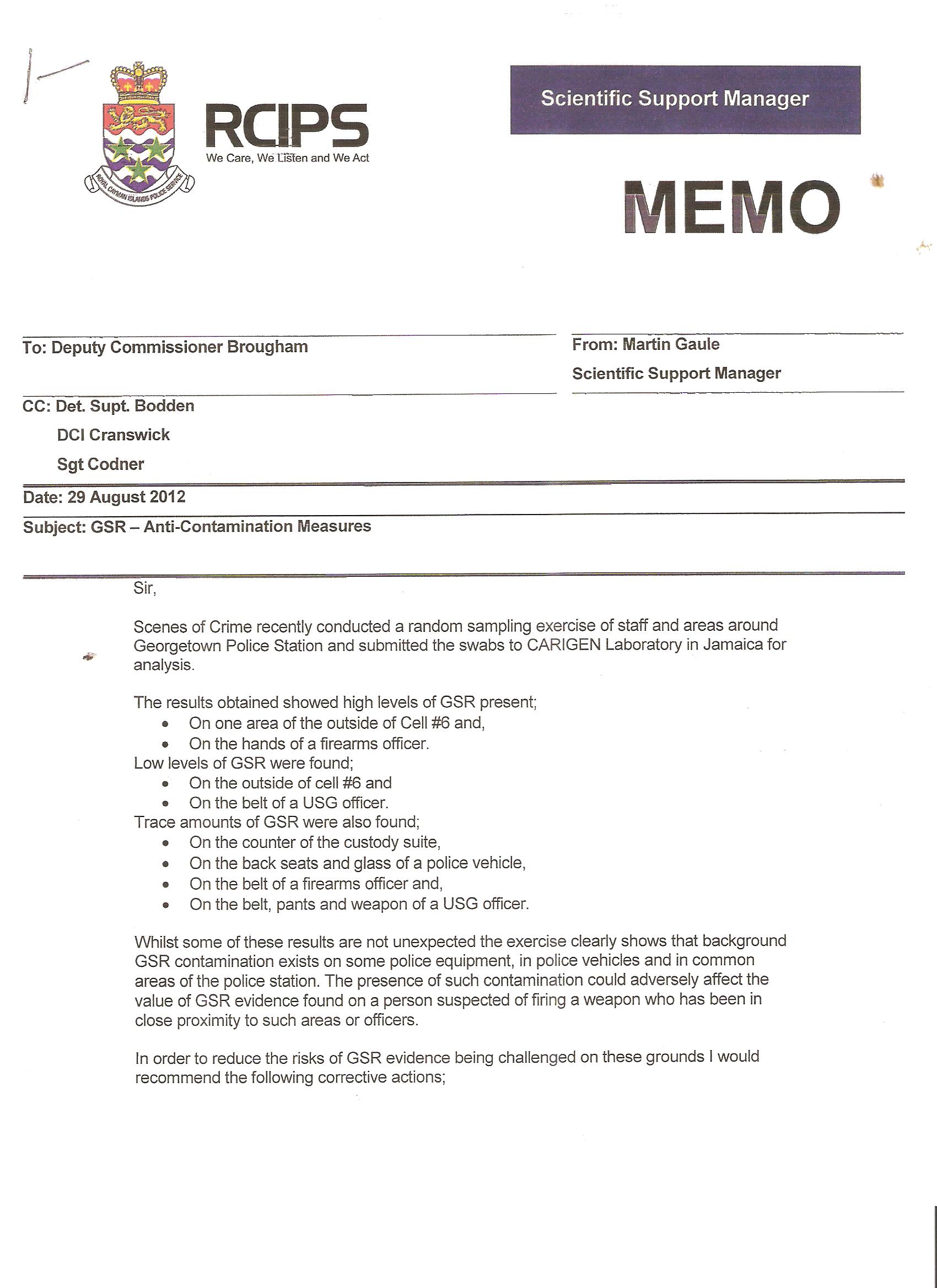
Cops contaminated with GSR
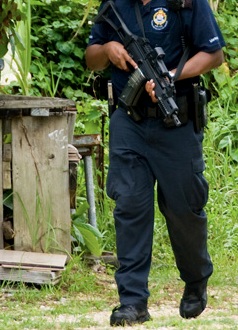 (CNS): A significant number of convictions and charges over firearms related cases could be at risk as a result of the amount of gun-shot residue (GSR) found at the George Town police station and on Uniform Support Group vehicles, equipment and officers. The findings of the survey conducted by the RCIPS into the levels of particle contamination show that there is a serious risk of contamination and transfer which could jeopardize cases where GSR is being used as evidence in trials or was used to bolster existing convictions. A memo by Scientific Support Manager Martin Gaule was disclosed to a local attorney in connection with a current case but it may have serious implications for many others.
(CNS): A significant number of convictions and charges over firearms related cases could be at risk as a result of the amount of gun-shot residue (GSR) found at the George Town police station and on Uniform Support Group vehicles, equipment and officers. The findings of the survey conducted by the RCIPS into the levels of particle contamination show that there is a serious risk of contamination and transfer which could jeopardize cases where GSR is being used as evidence in trials or was used to bolster existing convictions. A memo by Scientific Support Manager Martin Gaule was disclosed to a local attorney in connection with a current case but it may have serious implications for many others.
The lawyer, who received the report albeit very late, said the findings had serious implications for many cases before the courts, going back sometime.
"The belated release of a RCIPS forensic report dated 29 August on 10 October suggests widespread GSR contamination in RCIPS buildings and cars," Peter Polack told CNS. "A request had been made for such a report to have been completed in July 2010 by me but was refused by the DPP representative. This report will possibly compromise all firearm convictions in which the court relied on GSR evidence in the past several years.”
Summarizing the random survey, Gaule tells the deputy police commissioner in the memo that he found high levels of GSR on one of the cells and the hands of some officers, low levels on officers' uniforms and other cells, and trace levels at the custody suite, the USG vehicles and police equipment. He points out that this could adversely impact the value of GSR evidence in cases before the courts of those suspected of firing guns.
Gaule lists six recommendations for the RCIPS management to follow to reduce the risk to evidence. The forensic expert says it is not possible to entirely avoid GSR contamination and notes how the current levels demonstrate how easily particles can be transferred. As a result, he advises limiting the use of GSR evidence to cases where a weapon was very recently fired.
Besides bagging the hands of those arrested in connection with guns, Gaule recommends that firearms suspects are handled by officers who do not use guns themselves, wherever and whenever it is safe to do so. He suggests that suspects be conveyed in police cars not used by USG and that suspects are processed by scenes of crime officers or other non USG officers, supervised by someone from scenes of crime.
The forensic cop also recommends swabbing allthe areas where suspects are taken at the station and, above all, he stresses the need for USG officers using firearms at work or socially to take even more care to wash their hands and clothes thoroughly after touching guns and ammunition.
In addition, Gaule points to the need to continue random surveys every six months to monitor GSR background levels at the station and on officers.
The findings, which are now public and likely to be of interest to the entire local criminal defence bar, could upset not just forthcoming trials where the GSR is an important part of the evidence but possibly past cases where GSR has played a part in the conviction of suspects in gun-related crimes.
See memo below.

Procedural problems continue to plague FOI
 (CNS): In her latest decision over a Freedom of Information dispute the information commissioner has upheld a decision by the National Pensions Office to redact some of the documents it finally released. However, in her ruling Jennifer Dilbert highlighted the procedural problems that continue to plague FOI. The process of the request had taken “an inordinately long time”, and while significant records were released in the end, some were not disclosed until the course of the commissioner’s latest hearing, two years after the original request.
(CNS): In her latest decision over a Freedom of Information dispute the information commissioner has upheld a decision by the National Pensions Office to redact some of the documents it finally released. However, in her ruling Jennifer Dilbert highlighted the procedural problems that continue to plague FOI. The process of the request had taken “an inordinately long time”, and while significant records were released in the end, some were not disclosed until the course of the commissioner’s latest hearing, two years after the original request.
“With a timely and correct application of the FOI Law, these documents could have been reviewed, redacted as necessary, and disclosed much earlier, sparing the Applicant, the ICO, the NPO and the Legal Department much time and resources,” Dilbert said.
In this latest appeal an applicant had been refused access by the National Pensions Office to audited accounts and records of correspondence relating to Multiple and Single Employer pension plans. Following the Information Commissioner’s Decision 16 last year a significant number of records were disclosed, but some information was redacted.
As a result of those redactions relating to personal information, with the exception of two words the commissioner upheld the decision by the public authority to black out other words. Dilbert said that apart from one instance, the information consists solely of the names or signatures of officials in the various private sector companies associated with the pension plans
However, in her full decision she points to the delays caused to the hearing by a mixture of missed deadlines by the both the NPO and the Legal Department, which was acting for them, and that department’s late involvement and subsequent objections to various procedural matters, which required the ICO to take legal advice.
See the commissioner’s full decision below.
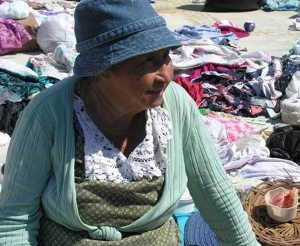
Women critical in disaster planning and recovery
 (CNS): Caymanian women and girls are often the “pillars of resilience” in the wake of disasters, the deputy governor said in a message marking International Day for Disaster Reduction, celebrated worldwide on Saturday. Franz Manderson said it was women who were the first to prepare their families for a disaster and, as was witnessed in both Hurricane Ivan and Hurricane Paloma, they were the first to put their communities back together in the aftermath. With “Women and Girls – the [in]Visible Force of Resilience" as this year’s theme, Manderson said that women have and continue to have a critical role in the nation’s development.
(CNS): Caymanian women and girls are often the “pillars of resilience” in the wake of disasters, the deputy governor said in a message marking International Day for Disaster Reduction, celebrated worldwide on Saturday. Franz Manderson said it was women who were the first to prepare their families for a disaster and, as was witnessed in both Hurricane Ivan and Hurricane Paloma, they were the first to put their communities back together in the aftermath. With “Women and Girls – the [in]Visible Force of Resilience" as this year’s theme, Manderson said that women have and continue to have a critical role in the nation’s development.
“The women and girls in the Cayman Islands are powerful agents of change,” the deputy governor said in his message. “They have unique knowledge and skills which are crucial when addressing and managing disaster risks and they are invaluable partners in preparing for and preventing disasters. Our women are activists, law makers, social workers, role models, community leaders, doctors, teachers, nurses, mothers, daughters and also comforters in those stressful times.”
See full message below.
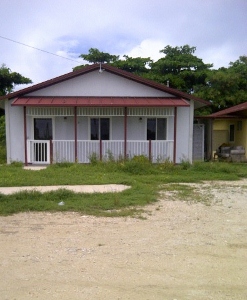
Housing Trust ends sales
 (CNS): There will be no more sales of government’s affordable homes in the short term as the programme has switched to leasing, the chair of the National Housing and Development Trust (NHDT) board revealed Thursday. Although government will continue to build new two- and three-bedroom houses, from now on the Trust will rent out the properties instead of selling them as the cost of the houses has passed the point where those they were intended for can actually afford to buy them. Rayal Bodden said that because of the cost of land and materials, it is simply not possible to build affordable family homes in Cayman that meet local building standards.
(CNS): There will be no more sales of government’s affordable homes in the short term as the programme has switched to leasing, the chair of the National Housing and Development Trust (NHDT) board revealed Thursday. Although government will continue to build new two- and three-bedroom houses, from now on the Trust will rent out the properties instead of selling them as the cost of the houses has passed the point where those they were intended for can actually afford to buy them. Rayal Bodden said that because of the cost of land and materials, it is simply not possible to build affordable family homes in Cayman that meet local building standards.
From the very beginning, the affordable housing initiative, which was started back in 2002 by the then community affairs minister Dr Frank McField, has faced significant problems. Having embarked on the project to try and build 200 cheap homes with $14.5million drawn down from a bond of around $29 million, the entire project soon became embroiled in scandal, exacerbated by Hurricane Ivan in September 2004.
The NHDT has been constantly undermined by a number of issues, including irregularities regarding the original procurement, McField's conflicts of interest with and the companies involved in the construction and repair after the storm (which was revealed by the Office of the Auditor General), and police investigations, both past and present.
Hurricane Ivan and subsequent insurance problems combined with the failure of the first properties to withstand the local environment ensured controversy has never been far away from the housing project. The latest controversy has seen a former board member charged with fraud and another police investigation.
Since then, however, a new board has been appointed with Bodden at the helm and the business of the project has turned in a new direction. Speaking to the media on Wednesday, Bodden stated that the financial situation at the Trust is stable and that the accounts up to this year have all been completed and audited by the auditor general.
Although the minister has not yet tabled the reports, none of them were qualified, Bodden said, and they are expected to be tabled in the Legislative Assembly next month, when they will become public documents.
With the various controversies behind it, Bodden said, the NHDT has undergone an extensive review and the battle it now faces is wrestling with its fundamental purpose, which is to provide low cost homes to those in need. It has continued the priority of replacing the old metal homes, which had deteriorated significantly since they were built just eight years ago, with concrete structures; however, in that process, the issue of affordability has been lost.
There are currently around 30 home owners who purchased the original cheaper properties, which were sold at $56,900 for a two-bedroom and $69,000 for a three-bedroom home, that have now been given properties that cost $97,500 for a two- and $114,000 for a three bedroom — a cost difference which has been absorbed by government.
Owners in both George Town and West Bay who have been of good standing and paid their home loans are now in the process of moving into the new properties. The rest of the residents in these government homes, however, are now renters and not owners.
Despite some controversies over the right to buy the homes, which appears to be down to poor communication with previous tenants, the chair said that government had made no promises to any of the previous rental tenants and its obligation was to those who were in the process of buying the properties and were paying their mortgages.
Although the suspension of salesis not permanent and the ultimate aim is still to assist people in owning their own home, a new national policy will be required to address how that might be achieved. With over 700 people on the Trust’s list, the need for cheap homes remains apparent. But, Bodden said, in the short term all of the tenants will be leasing the properties, probably until that policy is developed.
A new approach is needed, he said, to tackle the problem of how to create quality affordable houses that meet local standards and density requirements that can withstand hurricanes and that can provide a proper home for families that do not earn a sufficient amount to buy on the open market.
The new homes are now leased to families at a rate of $700 per month for a two bedroom house and $800 for a three — well below market rate for properties of such quality — but government will retain the new properties as assets.
The goal for the NHDT is to cover its own running costs with the rental income as it seeks new ways to tackle the housing needs of the community’s most vulnerable. Bodden said that if the NHDT reaches its goal of around 200 properties, the income should cover the cost of maintaining the homes and the Trust’s operating costs, which is currently subsidised by the public purse with an annual cash injection of around $500,000.
In the meantime, the NHDT is pressing on with the building programme using the remaining cash from the bond given to the Trust by government in 2003. The 29 homes in West Bay have now been replaced and the owners and tenants will be moving in shortly.
Another seven homes are being built at the site, which could hold more than twenty more houses. In East End twelve properties from a possible 40 have been completed, and in Bodden Town the NHDT has started building twenty new houses on a site that could hold a further twenty-five.
In George Town the Windsor Park site is at capacity with the 26 new homes that have been completed but there are still seven old homes at the Eastern Avenue location, six of which are occupied. Bodden said that the future of that site is under discussion and the Trust is looking at developing a different type of property there rather than stand-alone family homes. Bodden explained that there are different social demographics on the NHDT list that also need assistance, including elderly people not yet ready for a retirement home to teenage girls coming out of the care system.
Faced with myriad issues, the Trust will press on, Bodden stated, in an effort to address the problem of home ownership for low income families. For many, however, the dream of being a homeowner will remain elusive, quite simply because the cost of land and building a durable house is out of reach, and despite the political rhetoric of successive administrations, the government does not have the cash or the political will to subsidize that dream.

Jamaican vendors miss out on cruise dollars
 CNS): While Jamaicans are looking for more interaction with tourists arriving at the new port facility in Falmouth, cruise visitors have little interest in exploring “the sometimes gritty reality of life in a Caribbean port,” according to an article by AP’s reporter David McFadden. Vendors at the country’s new port are missing out as tourists are whisked away on tours organised by the ships. Some 80% of the tourist dollar is believed to leak from Jamaica, despite promises that the investment would benefit the local sellers and tour operators.
CNS): While Jamaicans are looking for more interaction with tourists arriving at the new port facility in Falmouth, cruise visitors have little interest in exploring “the sometimes gritty reality of life in a Caribbean port,” according to an article by AP’s reporter David McFadden. Vendors at the country’s new port are missing out as tourists are whisked away on tours organised by the ships. Some 80% of the tourist dollar is believed to leak from Jamaica, despite promises that the investment would benefit the local sellers and tour operators.
While the cruise industry is said to generate billions in the region, relatively little reaches the local economy when passengers dine, shop and purchase heavily marked-up shore excursions on the boats or splurge at international chain shops on the piers.
"We were promised that we'd be able to show people our Jamaican heritage, sell our crafts. But most of the tourists stay far away from the local people," said Asburga Harwood, an independent tour guide and community historian.
On a recent morning at Falmouth's port, tourists disembarked from Royal Caribbean's Allure of the Seas, a 5,400-passenger liner with a 3D movie theatre, ice rink, casino and multiple restaurants and bars. Most passengers were escorted onto buses destined for package tours in Jamaican resort meccas about an hour's drive away.
Related article:
Cayman cruise tourism improves while JA blossoms (8 October 2012)
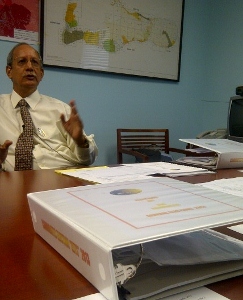
Elections Office makes kits for candidates
 (CNS): With just seven months to go before the governor prorogues the current parliament, the Elections Office is gearing up for the May 2013 general election. As part of its efforts to improve its services it has created a 'candidate kit', designed for anyone who plans to run in next year’s national ballot. To ensure that every candidate is fully aware of the laws and rules, the office has collated the constitution, elections law, important forms and paperwork, maps and details of polling and counting stations, the timetable of the process, information on election officials and a video all about running for office in one package.
(CNS): With just seven months to go before the governor prorogues the current parliament, the Elections Office is gearing up for the May 2013 general election. As part of its efforts to improve its services it has created a 'candidate kit', designed for anyone who plans to run in next year’s national ballot. To ensure that every candidate is fully aware of the laws and rules, the office has collated the constitution, elections law, important forms and paperwork, maps and details of polling and counting stations, the timetable of the process, information on election officials and a video all about running for office in one package.
The supervisor of elections told the press Thursday that the kit, which is an A-Z of the election, is part of a wider initiative to offer training for all candidates and to ensure that there are no excuses from any one running for office for not following the laws and rules governing elections.
At the last general election two UDP candidates, Mark Scotland and Dwayne Seymour, failed to meet the constitutional requirement to publish in a gazette all their interests in government contracts before a specific election deadline. Both men were allowed to go ahead and fight the election, however, as no lawful challenge was made to their right to run. When both men were elected to office, there was considerable controversy in the community when the attorney general failed to take any action against the men and what they had both said was an oversight and not a deliberate intention to deceive the electorate.
However, a group of voters from their constituency eventually mounted a challenge in the Grand Court via an originating summons. But the challenge failed after the deadline to file the action under the elections law was missed, which the chief justice ruled was the only way in law to make the challenge to the candidates' election to office.
Gomez said that the combination of the new kits, including the video, taking potential candidates through every step as well as all the rules and requirements regarding running for office, as well as the planned training sessions both ahead and after Nomination Day should fully prepare the fleet of would-be politicians for 2013.
The kits can now be collected from the office in Smith Road, priced at $125, which Gomez said covered the cost of producing the comprehensive kits.
Colford Scott, the deputy supervisor of elections, said that the governor has now approved the timeline for the countdown to the election, which begins on 12 December with the issuing by the governor of the election writ on 12 December.
Other key dates include 2 January, when the register for new voters wanting to take part in the election will close; the dissolution of parliament will be on 26 March followed by Nomination Day for candidates on 27 March. The general election day itself will be on Wednesday 22 May.
Related articles: